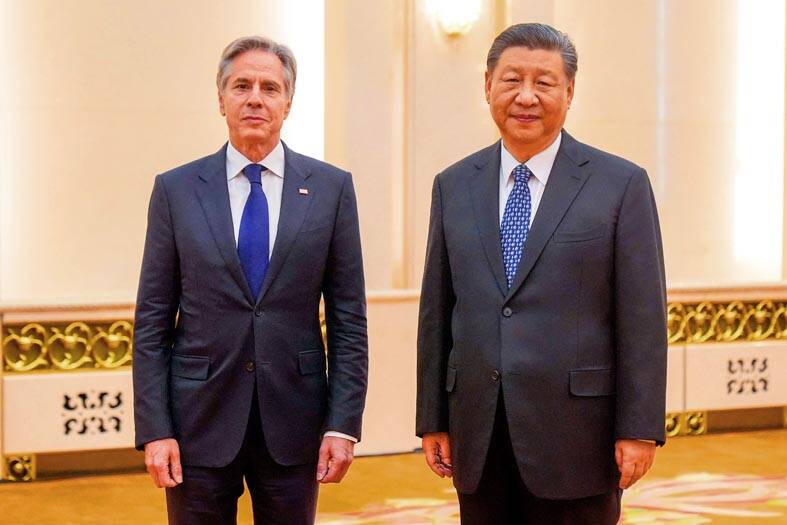US Secretary of State Antony Blinken yesterday met with Chinese President Xi Jinping (習近平) and senior Chinese officials, stressing the importance of “responsibly managing” the differences between the US and China as the two sides butt heads over a number of contentious bilateral, regional and global issues, including Taiwan and the South China Sea.
Talks between the two sides have increased over the past few months, even as differences have grown.
Blinken said he raised concerns with Xi about Taiwan and the South China Sea, along with China’s support for Russia and its invasion of Ukraine, as well as other issues including human rights, and the production and export of synthetic opioid precursors.

Photo: AFP
Blinken arrived in China on Wednesday, visiting Shanghai shortly before Biden signed the US$95 billion foreign aid package, including US$8 billion to counter China’s growing aggressiveness toward Taiwan and in the South China Sea. It also seeks to force TikTok’s China-based parent company to sell the social media platform.
Washington has become increasingly alarmed by Beijing’s growing aggressiveness toward Taiwan and its smaller Southeast Asian neighbors with which it has significant territorial and maritime disputes in the South China Sea.
China has railed against US assistance to Taiwan and immediately condemned the aid as a dangerous provocation. It also strongly opposes efforts to force TikTok’s sale.
Blinken sounded a positive note on the progress made in bilateral cooperation over the past few months, including in military communications, counternarcotics and artificial intelligence.
“We are committed to maintaining and strengthening lines of communication to advance that agenda, and again deal responsibly with our differences so we avoid any miscommunications, any misperceptions, any miscalculations,” he said.
However, he said he made clear to Xi ongoing concerns about Beijing’s supply of materials, including machine tools and micro electronics, to Moscow that Russian President Vladimir Putin is using to boost Russia’s defenses and its war on Ukraine.
“Russia would struggle to sustain its assault on Ukraine without China’s support,” Blinken told reporters after his meeting with Xi.
“Fueling Russia’s defense industrial base not only threatens Ukrainian security, it threatens European security,” he added. “As we’ve told China for some time, ensuring transatlantic security is a core US interest. In our discussions today, I made clear that China does not address this problem.”
Blinken also discussed with Xi China’s maritime maneuvers in the disputed South China Sea, and reiterated “ironclad” US support for the Philippines, its oldest treaty ally in Asia.
Xi said that China and the US must seek common ground “rather than engage in vicious competition.”
“China is happy to see a confident, open, prosperous and thriving US,” Xi said. “We hope the US can also look at China’s development in a positive light. This is a fundamental issue that must be addressed.”
Earlier, Blinken held lengthy talks with Chinese Minister of Foreign Affairs Wang Yi (王毅) and Minister of Public Security Wang Xiaohong (王小洪).
Blinken and Wang Yi underscored the importance of keeping lines of communication open as they lamented persistent and deepening divisions that threaten global security.
The US Department of State later said that in the meeting with Wang Yi, Blinken “emphasized that the US would continue to stand up for our interests and values and those of our allies and partners, including on human rights and economic issues.”
US officials have said China’s ties with Russia would be a primary topic of conversation during Blinken’s visit, and just before yesterday’s meetings began, Putin announced he would visit China next month.

President William Lai (賴清德) yesterday criticized the nuclear energy referendum scheduled for Saturday next week, saying that holding the plebiscite before the government can conduct safety evaluations is a denial of the public’s right to make informed decisions. Lai, who is also the chairman of the Democratic Progressive Party (DPP), made the comments at the party’s Central Standing Committee meeting at its headquarters in Taipei. ‘NO’ “I will go to the ballot box on Saturday next week to cast a ‘no’ vote, as we all should do,” he said as he called on the public to reject the proposition to reactivate the decommissioned

US President Donald Trump on Friday said that Chinese President Xi Jinping (習近平) told him China would not invade Taiwan while Trump is in office. Trump made the remarks in an interview with Fox News, ahead of talks with Russian President Vladimir Putin over Moscow’s invasion of Ukraine. “I will tell you, you know, you have a very similar thing with President Xi of China and Taiwan, but I don’t believe there’s any way it’s going to happen as long as I’m here. We’ll see,” Trump said during an interview on Fox News’ Special Report. “He told me: ‘I will never do

The Legislative Yuan yesterday approved an aid and recovery package authorizing the government to allocate up to NT$60 billion (US$1.99 billion) for regions hit by Typhoon Danas and subsequent torrential rains last month. Proposed by the Executive Yuan on Aug. 7, the bill was passed swiftly after ruling and opposition lawmakers reached a consensus in inter-party talks on relief funding and assistance for disaster-stricken areas. The package increases the government’s spending cap from the originally proposed NT$56 billion to NT$60 billion, earmarked for repairing and rebuilding infrastructure, electricity systems, telecommunications and cable TV networks, cultural heritage sites and other public facilities.

FLEXIBLE FORCE: Only about 10 percent of small drones reach their target, an expert said, which is why it is important to make it easier to procure large numbers of drones The military is planning to recategorize military drones as “consumables/munitions,” rather than as aircraft, to speed up the procurement process, the army said yesterday. The Army Command Headquarters said the decision was made because drones, like munitions, need to be rapidly replaced, and thus should be categorized as consumables/munitions “to meet the army’s practical needs.” The headquarters’ confirmation came after the Chinese-language Liberty Times (the Taipei Times’ sister paper) early yesterday reported that the army was about to make the classification change based on the example of the US, which is Taiwan’s biggest arms provider. US Secretary of Defense Pete Hegseth announced a